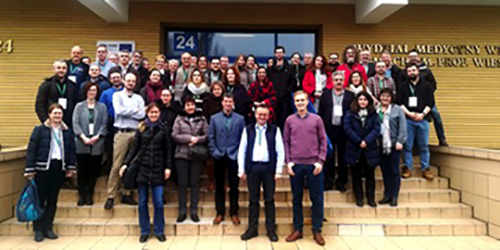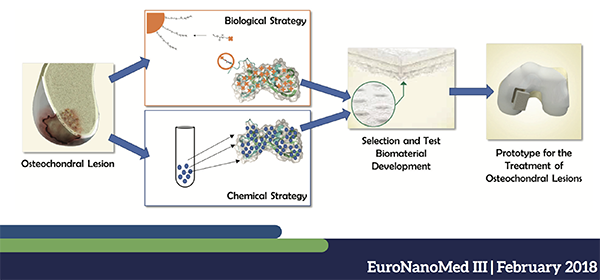Research News
Researchers Create New Network to Combat Anthelmintic Resistance in Livestock
In February this year, 59 researchers from 25 countries met for the first time at the University of Life Sciences of Warsaw, Poland, to discuss a coordinated approach in tackling anthelmintic resistance in ruminants. The UCD School of Veterinary Medicine's Associate Professor Theo de Waal, European Veterinary Specialist in Parasitology, is representing Ireland on the Management Committee. The network (COMBAR – COMbatting Anthelmintic Resistance in Ruminants) will be supported over the next 4 years by the EU COST programme, and it aims to harmonize procedures, train young researchers and generate new data to support the transition to sustainable worm control approaches. It will focus on 3 pillars: diagnostics, socio-economic aspects and novel control approaches. 
Anthelmintics are a particular drug class that are used to treat parasitic worm infections. These infections are a common and important problem in livestock production around the world. Strategic use of anthelmintics has been very successful in reducing clinical parasitic disease and enhancing resource-efficient livestock production. This contributes to cheaper food prices and reductions in water use and greenhouse gas emission of the sector. Today, the ruminant livestock industry is increasingly confronted with parasitic worms that have become drug resistant. This is called anthelmintic resistance and is a part of the antimicrobial resistance phenomenon. New solutions need to be found to preserve the efficacy of the drugs and develop a broader panel of control options.
'For maintaining the health, welfare and productivity of ruminant livestock, we need to shift the way we use anthelmintics and develop a broader panel of control options including novel diagnostics, vaccines, nutraceuticals and pasture management procedures. Thanks to the COST programme, we will be able to create an important and diverse network across Europe. Along the process, we aim to reach out to industry, regulators and various stakeholders to share new data and discuss recommendations for best practices and new solutions', said Johannes Charlier (Kreavet), Chair of the Action.
Further information, including a complete description of the COMBAR programme and aims can be found at: (opens in a new window)http://www.cost.eu/COST_Actions/ca/CA16230
Professor Pieter Brama Part of Group Awarded Funding under EuroNanoMed3 - European Innovative Research & Technological Development Projects in Nanomedicine
Professor Pieter Brama, Full Professor of Veterinary Surgery in the UCD School of Veterinary Medicine, is part of a group which has been awarded funding under EuroNanoMed3. EuroNanoMed, established in 2008, is a platform for funding agencies and ministries. National and Regional research funding programmes join together with the goal of creating and funding collaborative research and innovation projects that can convert research in nanotechnology into practical gains in medicine. EuroNanoMed supports multidisciplinary and translational research and innovation projects that cover: Regenerative medicine, Diagnostics and Targeted delivery systems.
In response to the 8th Joint Transnational Call 2017, 126 eligible pre-proposals involving 588 groups from 20 different countries were submitted. After the first evaluation step, 39 proposals were invited to the second stage. Following the recommendations of the Peer Review Panel, the funding organisations participating in the EuroNanoMed cofunded call were able to fund (opens in a new window)16 innovative research projects in Nanomedicine - with a total investment of approximately €14 million over three years.
Professor Pieter Brama is part of the (opens in a new window)Nano-Scores project, with partners in The Netherlands, Latvia, France and Italy; the project is coordinated by Dr Giuseppe Filardo from the Istituto Ortopedico Rizzoli in Italy. The total budget allocated to this project is €1.2 million.
(opens in a new window)Nano-Scores: Nanostructured Osteochondrial Scaffold: Novel Biomimetic Triggers for Enhanced Bone Regeneration
Degeneration of the articular osteochondral tissues causes pain and decreased function leading to osteoarthritis (OA), one of the most globally widespread diseases with a huge impact on society. OA development and progression could be prevented by regenerating the osteochondral unit. Until now, the regeneration of the subchondral bone remains a critical aspect, dooming most patients to prosthetic implants. 
This project aims to revolutionize osteochondral regeneration by developing new nano-strategies to trigger and sustain subchondral bone regeneration. The first strategy will chemically improve the bone layer of an osteochondral scaffold through nanostructured “ion banks”. The second strategy will biologically improve the new nanostructured material through bioactive and bioconjugated peptides for osteoprogenitor cells homing and stimulating bone formation. The most promising strategy will be evaluated with a translational approach up to a model closely resembling the human application, developing a successful regenerative prototype for the treatment of osteochondral lesions and the prevention of OA.